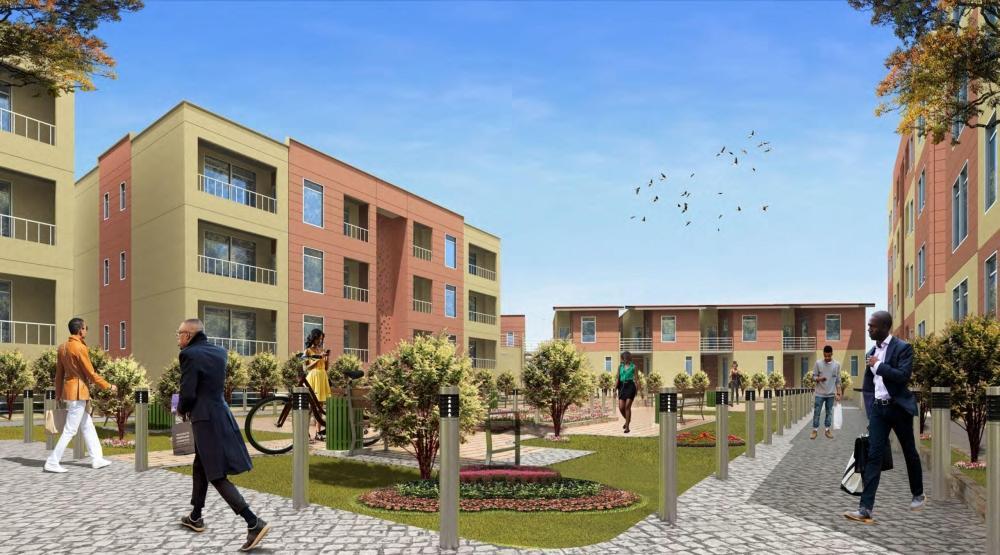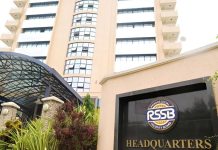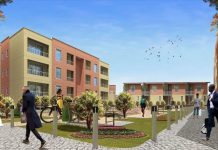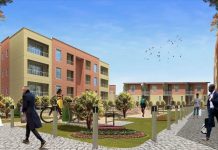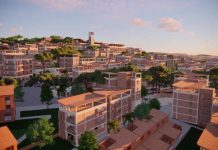Africa-Press – Rwanda. Rwanda Social Security Board (RSSB) has announced that 70 percent of residential housing units at its Heza Estate project have already been subscribed to, despite the project still being under construction.
Located in Batsinda, Kinyinya Sector of Gasabo District in Kigali, Heza Estate comprises 548 housing units. The estate is positioned as a middle-income housing project and is expected to officially launch sales before the end of 2025, while its completion is scheduled next year (in 2026).
RSSB CEO Regis Rugemanshuro spoke during a press conference in Kigali on September 10. Photo by Dan Gatisinzi
Speaking on September 10 at a press conference reviewing the fund’s 2024/2025 performance and its five-year strategy (2021–2025), RSSB CEO Regis Rugemanshuro explained that the board’s real estate investments are categorised into three segments: high-end, middle-income, and affordable housing.
He clarified that Vision City, another RSSB-backed development – located in Gacuriro, Gasabo District, Kigali – spans both high-end and middle-income segments, while Heza Estate focuses specifically on the middle-income category.
Vision City phase one, which consisted of 504 housing units, was officially completed in 2018 and was sold out by 2023, while the development of Vision City phase two is underway and is expected to comprise more than 1,497 housing units.
Official pricing for Heza Estate units is expected to be announced by the end of the current month, with prices ranging between Rwf80 million and Rwf120 million, Rugemanshuro said.
“Although construction is not yet complete, 70 per cent of the units have already been subscribed to, which shows a strong market demand for housing in this category,” he observed.
Heza Estate is conceptualised as the first middle-income neighbourhood in Rwanda, utilising precast concrete technology, according to Ultimate Developers (UDL) Ltd, a subsidiary of RSSB responsible for its real estate development business management in commercial and residential areas.
Precast concrete is used for its durability and low maintenance, it indicated, adding that the Heza Estate residential units range from one-bedroom to three-bedroom apartments, with retail and green spaces.
Challenges in affordable housing
Addressing the issue of affordable housing, Rugemanshuro acknowledged that it remains a complex area due to cost, technology, and infrastructure challenges.
Rwanda’s affordable housing policy states that an affordable house should not exceed Rwf40 million or Rwf50 million, with payment spread over a 15- to 20-year period.
“It is difficult to build strong, decent homes that fall within affordable price ranges using current technologies,” Rugemanshuro said.
Affordable housing projects, he pointed out, often require infrastructure that may need to be provided by the government, raising the question of how much support developers should request from the government without creating a financial burden.
While acknowledging the strong demand for affordable housing, he underscored the importance of careful planning.
“We have a responsibility to explore viable solutions, but we are avoiding being hasty,” Rugemanshuro said.
For instance, instead of directly implementing affordable housing projects, RSSB has chosen to support government-led initiatives. He cited the Nyabisindu rehousing project in Remera Sector, Gasabo District, as an example, where RSSB plays a supporting role without being the primary executor.
“Nyabisindu is a promising model for affordable housing. Upon completion, it will stand as one of the better-executed initiatives in this segment,” he observed.
As the institution responsible for managing the country’s social security, RSSB’s investment strategy is designed to secure the long-term financial well-being of contributors. As such, it says, its investments must be strategic enough to generate stable returns, ensuring that retirees receive adequate pension benefits for a dignified retirement.
For More News And Analysis About Rwanda Follow Africa-Press

